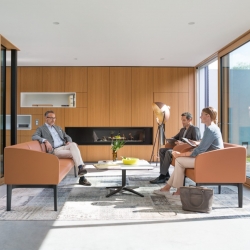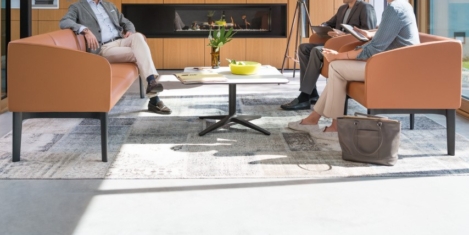January 4, 2022
January 4, 2022
Hybrid working will demand leaders develop new communication skills
by David Mills • Comment, Flexible working
 Keeping on top of communication barriers in the business world can feel like an endless game of Whac-A-Mole, especially now in the new era of hybrid working. The usual culprits are well-known by now: patchy WiFi connections, crashing computer programmes, cloud syncing issues, important emails sneaking into spam folders – the list goes on. All can impede our ability to get the job done. (more…)
Keeping on top of communication barriers in the business world can feel like an endless game of Whac-A-Mole, especially now in the new era of hybrid working. The usual culprits are well-known by now: patchy WiFi connections, crashing computer programmes, cloud syncing issues, important emails sneaking into spam folders – the list goes on. All can impede our ability to get the job done. (more…)
December 14, 2021
Drawing on internal skills can help firms cope with Great Resignation
by Mike Baker • Comment, Workplace
 The UK’s workforce is undergoing rapid transformation as employees’ expectations and motivations radically change. The impact of Brexit, COVID-19 and long periods of furlough have created a tidal wave of resignations across every industry. Workers are re-thinking career paths, work conditions and long-term goals after a turbulent 18 months; with one study finding that 38 percent of people are looking to change roles in the new year. (more…)
The UK’s workforce is undergoing rapid transformation as employees’ expectations and motivations radically change. The impact of Brexit, COVID-19 and long periods of furlough have created a tidal wave of resignations across every industry. Workers are re-thinking career paths, work conditions and long-term goals after a turbulent 18 months; with one study finding that 38 percent of people are looking to change roles in the new year. (more…)
December 7, 2021
What the 21st Century office of the future looked like in the 1960s
by Mark Eltringham • Comment, Furniture, Technology, Workplace design
 We’re used to hearing people predict what The Office of the Future will look like. It’s been going on for a very long time now and each new generation of commentators on the subject comes up with its own forms of wishful thinking, wild generalisations, distorted conclusions and failures to account for the inherent unknowability of future disruptive technology. The best way of reminding ourselves of these pitfalls is not to look forward, but back. Only then can we see how an image can be refracted and make allowances. (more…)
We’re used to hearing people predict what The Office of the Future will look like. It’s been going on for a very long time now and each new generation of commentators on the subject comes up with its own forms of wishful thinking, wild generalisations, distorted conclusions and failures to account for the inherent unknowability of future disruptive technology. The best way of reminding ourselves of these pitfalls is not to look forward, but back. Only then can we see how an image can be refracted and make allowances. (more…)
December 6, 2021
We must wake up to the realities of workplace sustainability
by Oliver Cripps • Comment, Environment, Workplace design
 Sustainability has been steadily moving up the business agenda over the past few years, with COP26 placing more emphasis on the need for organisations to demonstrate that their operations are sustainable and lessening their overall impact on the planet. Many businesses may feel daunted by the challenges ahead, and there are certainly big steps that need to be taken in order to reduce corporate carbon footprints and move to more sustainable models. (more…)
Sustainability has been steadily moving up the business agenda over the past few years, with COP26 placing more emphasis on the need for organisations to demonstrate that their operations are sustainable and lessening their overall impact on the planet. Many businesses may feel daunted by the challenges ahead, and there are certainly big steps that need to be taken in order to reduce corporate carbon footprints and move to more sustainable models. (more…)
December 3, 2021
Menopause may amount to a disability under law in some cases
by Kathryn Clapp • Comment, Flexible working, Wellbeing
 World Menopause Day is held each year on 18 October and its purpose is “to raise awareness of the menopause and the support options available for improving health and wellbeing” according to the International Menopause Society. This autumn, we have seen this awareness translated into a practical response by the UK Government. (more…)
World Menopause Day is held each year on 18 October and its purpose is “to raise awareness of the menopause and the support options available for improving health and wellbeing” according to the International Menopause Society. This autumn, we have seen this awareness translated into a practical response by the UK Government. (more…)
December 1, 2021
Being a compassionate leader is good for business
by Paul Hargreaves • Business, Comment, Wellbeing
 One leadership characteristic that I believe should be prioritised above all others is compassion because every day I see that the world could benefit from kinder leaders. All other leadership qualities are interconnected with compassion. If we are to feel and demonstrate compassion, it is imperative to have a deeper understanding of connectivity with others and how to develop as a compassionate leader. (more…)
One leadership characteristic that I believe should be prioritised above all others is compassion because every day I see that the world could benefit from kinder leaders. All other leadership qualities are interconnected with compassion. If we are to feel and demonstrate compassion, it is imperative to have a deeper understanding of connectivity with others and how to develop as a compassionate leader. (more…)
December 1, 2021
There are thirty-eight ways to win an argument, but this ain’t one
by Mark Eltringham • Comment, Flexible working
 There are 38 ways to win an argument. That is according to the 19th Century German philosopher Arthur Schopenhauer who laid them out in an essay called The Art of Being Right. We’ve probably added a few more since it was published in 1896, but whatever we’ve come up with since probably works on the same basis. Despite the essay’s title, the stratagems are not actually about being right at all, but about winning an argument. (more…)
There are 38 ways to win an argument. That is according to the 19th Century German philosopher Arthur Schopenhauer who laid them out in an essay called The Art of Being Right. We’ve probably added a few more since it was published in 1896, but whatever we’ve come up with since probably works on the same basis. Despite the essay’s title, the stratagems are not actually about being right at all, but about winning an argument. (more…)
November 29, 2021
Winds of change are blowing through the office
by Ben Capper • Comment, Wellbeing, Workplace design
 Whilst driving through Zürich in a hailstorm I passed a Mercedes with a plastic bin liner taped over a missing window. Two thoughts struck me. First: this must be the result of the owner locking himself out of the car, as car crime is a fictional event in Switzerland (bike theft is preferred). The second was how utterly pointless this flapping piece of plastic served as an attempt to seal the broken window. (more…)
Whilst driving through Zürich in a hailstorm I passed a Mercedes with a plastic bin liner taped over a missing window. Two thoughts struck me. First: this must be the result of the owner locking himself out of the car, as car crime is a fictional event in Switzerland (bike theft is preferred). The second was how utterly pointless this flapping piece of plastic served as an attempt to seal the broken window. (more…)
November 19, 2021
Workplace data proves that the devil is in the detail for the new era of work
by Steve Morren • Comment, Flexible working, Technology, Workplace design
 Predicting the future is a fool’s errand. History is littered with examples of people who got it horribly wrong. In 1876, William Orten, the president of then telegraphy pioneer Western Union, claimed that the telephone was an idiotic, ungainly and impractical idea that would never catch on. Almost a century later, Microsoft’s Bill Gates said that nobody would ever need more than 640KB of memory in a computer. Today’s home computers and laptops can store up to 32GB of memory. (more…)
Predicting the future is a fool’s errand. History is littered with examples of people who got it horribly wrong. In 1876, William Orten, the president of then telegraphy pioneer Western Union, claimed that the telephone was an idiotic, ungainly and impractical idea that would never catch on. Almost a century later, Microsoft’s Bill Gates said that nobody would ever need more than 640KB of memory in a computer. Today’s home computers and laptops can store up to 32GB of memory. (more…)
November 11, 2021
Hybrid working is both a challenge and opportunity for comms firms
by Andrew Walker • Comment, Flexible working, Technology
 Huge swathes of workers have been returning to the office in recent weeks – many for the first time in almost two years. A significant number of companies, however, will never return to the pre-pandemic ‘normal’ of a five-day office week and will instead integrate hybrid working permanently. According to the CIPD, 40 percent of employers expect more than half their workforce to regularly work from home after the pandemic has ended. (more…)
Huge swathes of workers have been returning to the office in recent weeks – many for the first time in almost two years. A significant number of companies, however, will never return to the pre-pandemic ‘normal’ of a five-day office week and will instead integrate hybrid working permanently. According to the CIPD, 40 percent of employers expect more than half their workforce to regularly work from home after the pandemic has ended. (more…)






 That’s right. A New Year and still
That’s right. A New Year and still 


















January 5, 2022
‘Great Resignation’ offers a one off opportunity to rethink our relationship with work
by Pip White • Comment, Flexible working, Technology, Wellbeing